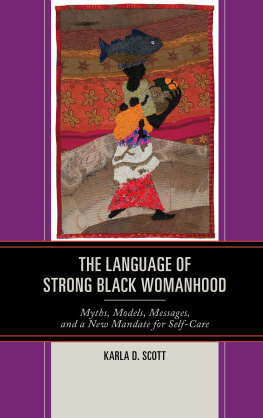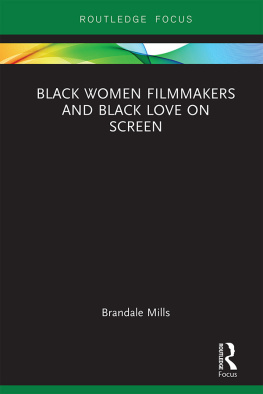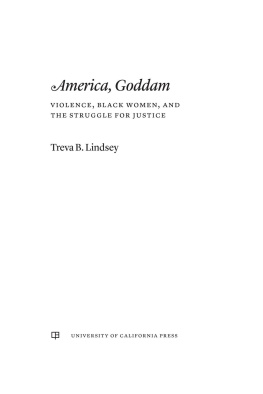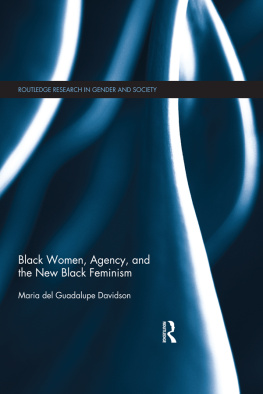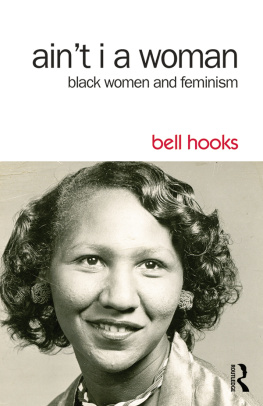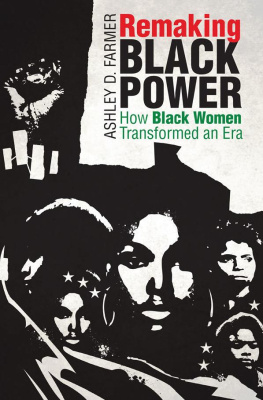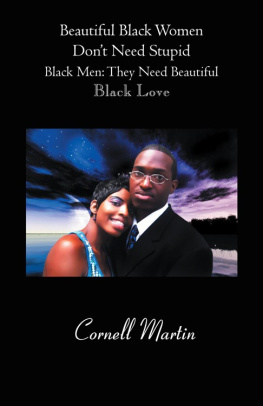2017 The University of North Carolina Press
All rights reserved
Designed by April Leidig Set in Electra by Copperline Book Services, Inc.
Manufactured in the United States of America
The University of North Carolina Press has been a member of the Green Press Initiative since 2003.
Cover illustration: White Robed Women at Black Muslim Convention, Chicago Coliseum, 1965. Courtesy of Sun-Times Media.
Library of Congress Cataloging-in-Publication Data
Names: Taylor, Ula Y., author.
Title: The promise of patriarchy : women and the Nation of Islam / Ula Yvette Taylor.
Other titles: John Hope Franklin series in
African American history and culture.
Description: Chapel Hill : University of North Carolina Press, [2017] |
Series: The John Hope Franklin series in African American history and culture | Includes bibliographical references and index.
Identifiers: LCCN 2017021189 | ISBN 9781469633923 (cloth : alk. paper) | ISBN 9781469633930 (pbk : alk. paper) | ISBN 9781469633947 (ebook)
Subjects: LCSH: Nation of Islam (Chicago, Ill.)History20th century. | Black MuslimsSocial conditions. | African American womenSocial conditionsHistory20th century. | Muslim womenUnited StatesSocial conditionsHistory20th century. | Patriarchy.
Classification: LCC BP221 .T39 2017 | DDC 297.8/7dc23
LC record available at https://lccn.loc.gov/2017021189
FIGURES
Black men in court with palms upward
Reformer Burnsteen Sharrieff, 1932
Police lineup photo of seven followers of Master Fard after their arrest for rioting
Mrs. P. Bahar, Elijah Mohammad, and Linn Karriem, Baltimore Afro-American, October 10, 1942
Sister Clara Mohammad dressed in white regalia
Nation of Islam meeting, Washington, D.C., 1961
Mrs. Betty Shabazz, New York Herald-Tribune, June 30, 1963
Heavyweight boxer Muhammad Ali flirts with Belinda Boyd in a Nation of Islam bakery shop, 1966
Muhammad Ali marries seventeen-year-old Belinda Boyd in a ceremony in his home in Chicago, August 18, 1967
Elijah Muhammad and a secretary, January 14, 1972
Sister Clara Muhammad and Tynnetta Muhammad, Saviours Day Convention, February 26, 1963
Graduation, University of Islam, Chicago, 1962
Sister Dorothy Fardan
Sister Burnsteen Muhammad and Brother John Muhammad, 1988
ACKNOWLEDGMENTS
I wrote this book while grieving the loss of my best friend and last surviving sibling, Willa Nanette Taylor. She was my joy. Sadly, her passing was accompanied by that of other dear ones: my maternal grandmother, Willie Rogers; my paternal aunt Jean Cole; and friends who were also familyVeVe Clark, Lamonte Toney, Sharla Dundy-Millender, Lynnea Stephens, Benita Robinson, Laurie Warren, and Marti Adams. My work has sustained me. Thinking, writing, and teaching about historical subjects who have done so much with so little, who daily reinvent ways to make meaning and share love, have served as an example of how to move forward as you hold in your heart those who have gone before you.
If I were a poet, I would utilize the haiku form, which concisely captures so much emotion and passion, to express my gratitude to all who have supported my efforts to write this book about women and the Nation of Islam between 1930 and 1975. What follows is a modest attempt; I cannot properly thank everyone in a few lines, because I lack exquisite poetic gifts.
I am very thankful to archivists and reference librarians who have replied to my emails, returned my phone calls, copied materials, and located documents. I am extremely grateful to Rebecca Darby, a reference specialist of microfilm and newspaper collections, and to Jesse Silva, a government information archivist, both at the University of California, Berkeley; as well as to Louis Jones and Elizabeth Clemens at Reuther Library at Wayne State University. Equally significant, Best Efforts Inc., a research powerhouse under the direction of one scholar, Paul Lee, has met my numerous requests with patience and generous care for detail and accuracy. I am so grateful that Paul Lee consistently pressed me to write an honest story. You are a brilliant scholar and a blessing to all who know you.
In addition to traditional archivists, scholars who were aware of my work sent me citations and leads that I otherwise would have missed. I especially appreciate Zain Abdullah, Garrett Felber, Harry Edwards, Gerald Horne, and Peter Goldman (who even purchased eBay material on my behalf). Robyn Spencer and Baiyina Muhammad, gifted scholars of Black Womens history, forwarded materials and intellectually motivated me.
I interviewed numerous former members of the Nation of Islam. They trusted me with their personal thoughts, hopes, and joys. I have done my best to honor their experiences. In particular, I am deeply grateful to Khalilah Camacho-Ali, J. Tarika Lewis, Waheedah Muhammad, Baheejah Shakur, Doris Shahrokhimanesh, Sara Sharif, Sonia Sanchez, and Zoharrah Simmons. Nur and Medina Mohammed gave me permission to reprint the lovely 1932 image of their mother, Reformer Burnsteen Mohammad, and I cannot thank them enough for their generosity.
My colleagues and students in the African American Studies Department at the University of California, Berkeley, have been awesome. Lindsey Herbert Villarreal, who has literarily picked me up off my office floor twice, has been there for me when I most needed it. I very much appreciate the ladder faculty who help to maintain the integrity of our department. My colleagues (Brandi Wilkins Catanese, Nikki Jones, Leigh Raiford, Stephen Small, Ugo Nwokeji, Sam Mchombo, Michael Cohen, Darieck Scott, Tianna Paschel, Jovan Lewis, and Chiyuma Elliott) are transforming the fields of African American and African diaspora studies, and I feel honored to share the sixth floor of Barrows Hall with you.
I am a proud technological dinosaur. At times, however, its a tremendous burden, so I deeply appreciate my graduate students Jarvis Givens, Zachary Manditch-Prottas, Ronald Williams, Christina Bush, Jessyka Finley, Ameer Loggins, Amani Morrison, Kia Middleton, Selina Makana, as well as my undergraduate, Summer Masson, who were all only a scream away.
I received financial support to pay for image permissions from both the UC Consortium for Black Studies and the H. Michael and Jeanne Williams Department of African American Studies Chair.
At the University of North Carolina Press, Waldo Martin (series editor) and Jad Adkins (assistant to Charles Grench) encouraged me and brought clarity to the project. Tera Hunter and Saidiya Hartman, my brilliant writing partners, who read every chapter closely and weighed in on how to conceptually compose a narrative about women who made choices that rubbed against my feminist sensibilities, evidence how sister-friends can provide beautiful, generous critiques. Our summer retreats held me accountable and forced me to write during the academic year. I most appreciate that both of you gave me permission to write convoluted drafts! Paul Lee, Peter Goldman, and Imam Malik Mubashshir also read numerous drafted chapters, corrected my mistakes, and provided unparalleled insight on an array of documents and concerns related to the Nation of Islam. My copy editor, Susan Whitlock, helped me present a more polished manuscript. As a result of these colleagues collective criticism, my book has fewer errors than it would have otherwise contained.


